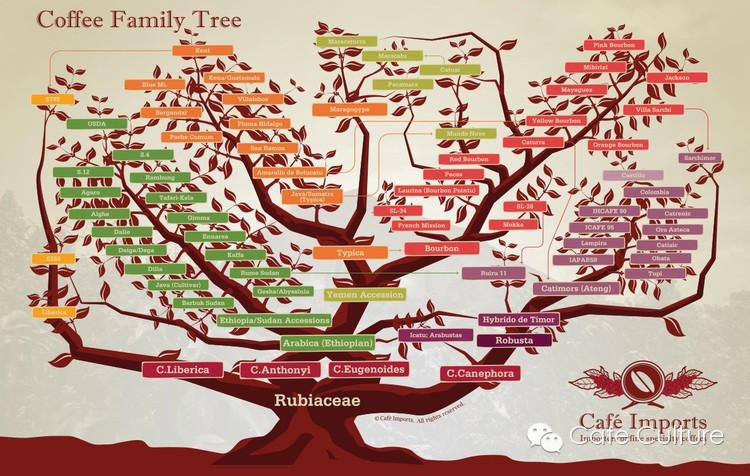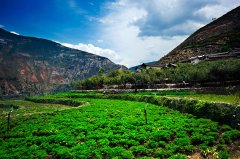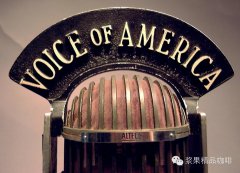What affects the final quality of coffee?
Coffee is always compared with red wine. This can help us to explore the infinite possibilities of coffee. When you choose red wine, you are always asked, "Red wine or white wine?" Through simple questions, people can distinguish the basic characteristics of red wine, and the skill of identifying red wine is very popular all over the world.

Similarly, when you are choosing coffee, you will be asked, "mild, medium or deep roasting?" This simple classification can help you identify the taste of coffee, or at least you know that deep-roasted coffee is usually bitter. But unlike red wine, different roasting companies have different classification criteria for the roasting degree of coffee. Therefore, we at Roast Ratings want to help people establish a unified classification standard by identifying and describing the true taste of all kinds of coffee around the world.
If all the coffee tastes the same, then our task will be much easier. But it's obviously impossible. Like other foods, coffee tastes different from region to region, because coffee starts with a fruit on a tree and goes through many stages such as processing, processing and transportation before it can finally be presented to consumers. In this process, many external factors will affect the taste of coffee. It is conceivable that it is a difficult challenge to produce and produce a cup of high-quality coffee with perfect taste.
The following series of pictures show you how coffee changes from a fruit to a delicious cup, and what will affect the final quality of the coffee:
Coffee beans: like Pinot noir and Cabernet in grape varieties, each coffee, such as Bourbon and SL-28, has its own unique taste characteristics.
Planting: the higher the altitude of the producing area, the higher the quality of the coffee, and the more full-bodied and fresh the coffee taste. The slower the coffee grows, the higher the degree of sugar condensation in the fruit.
Climate and environment: temperature, soil and precipitation all affect the quality of coffee.
Maturity: once the coffee fruit is dark red, it will mature perfectly. The problem is that even the fruit on a coffee tree ripens at different times, which makes picking very difficult.
Picking: coffee is picked by hand in most of the world's producing areas. Each fruit contains 2 coffee beans.
Raw bean treatment: this process requires the removal of the peel and pulp of the fruit and the final production of pure coffee beans. What is shown in the picture is the washing process. People use water washing to remove the peel and pulp.
Drying: raw beans must be completely dry before export and storage. In this process, workers need to turn the raw beans regularly to ensure complete and uniform drying.
Another method of raw bean treatment preserves the peel and pulp during drying and removes it during the period after drying. This processing method is extremely difficult and takes longer. The coffee fruit in the picture shows a bright yellow.
Storage: dried coffee beans are bagged for export. The purpose of using gunny bags is to isolate raw coffee beans from all kinds of external factors, so people usually choose plastic-lined sacks to pack raw coffee beans.
Transport (sea): usually, coffee beans are shipped to all parts of the world by sea. Because of the risk of transportation delays, people will put coffee beans in containers to avoid spoilage.
Baking: baking is an art. Once the raw beans arrive at the baking company, bakers must use all their skills to show people the most unique taste of coffee beans.
Freshness: once the coffee beans go bad, the taste will become lighter and the taste will become extremely thin. Therefore, roasting companies must choose the best logistics companies to ensure the freshness of coffee.
Grinding: the grinding process will directly affect the heaviest taste of coffee. Many professionals will use electronic bean grinders with set parameters to ensure the quality of coffee powder. Usually people make small mistakes when they grind coffee at home.
Brewing: only the correct brewing method can release the full taste of coffee. Once the operation goes wrong, all previous efforts will come to naught.
From this we can see that in order to improve the quality of coffee, everyone must make hardships and efforts. The same is true of other delicacies. We are glad to see that people are constantly pursuing the highest quality of food. Although we have different levels of coffee knowledge, we all share the same dream of tasting a mellow and delicious perfect coffee.
Important Notice :
前街咖啡 FrontStreet Coffee has moved to new addredd:
FrontStreet Coffee Address: 315,Donghua East Road,GuangZhou
Tel:020 38364473
- Prev

Yunnan Coffee A hundred-year Coffee Legend in Zhukula Village, Dali, Yunnan
Zhu Kula, located in the depths of the mountains in the northeast of Pingchuan Town, Binchuan County, Yunnan Province, is the junction of Chuxiong, Dali and Lijiang, surrounded by the Yupao River, a tributary of the Jinsha River. Due to inconvenient transportation, Zhu Kula is almost isolated from the rest of the world, so it is a little-known Yi shanzhai. When it comes to the history of Chinese coffee, we have to mention Zhukula Coffee in Dali, Yunnan.
- Next

VOA's report on Chinese Coffee
I also think of what Chris, one of the bosses of first Coffee, said yesterday: the reason why Chinese coffee practitioners have low average status, low salary and low quality is caused by misconceptions in their own country. How can the salary of a barista be high if the cafe is not profitable? It's not like a cafe in Australia selling thousands of cups a day! The baristas there certainly make a lot of money from his words until now.
Related
- What grade does Jamaica Blue Mountain No. 1 coffee belong to and how to drink it better? What is the highest grade of Blue Mountain coffee for coffee aristocrats?
- What are the flavor characteristics of the world-famous coffee Blue Mountain No. 1 Golden Mantelin? What are the characteristics of deep-roasted bitter coffee?
- Can I make coffee a second time in an Italian hand-brewed mocha pot? Why can't coffee be brewed several times like tea leaves?
- Hand-brewed coffee flows with a knife and a tornado. How to brew it? What is the proportion of grinding water and water temperature divided into?
- What is the difference between Indonesian Sumatra Mantinin coffee and gold Mantinin? How to distinguish between real and fake golden Mantelin coffee?
- What does bypass mean in coffee? Why can hand-brewed coffee and water make it better?
- Unexpected! Ruixing Telunsu lattes use a smoothie machine to foam milk?!
- % Arabia's first store in Henan opens into the village?! Netizen: Thought it was P's
- Does an authentic standard mocha coffee recipe use chocolate sauce or powder? Mocha Latte/Dirty Coffee/Salty Mocha Coffee Recipe Share!
- What is the difference between Vietnam egg coffee and Norway egg coffee? Hand-brewed single product coffee filter paper filter cloth filter flat solution!

